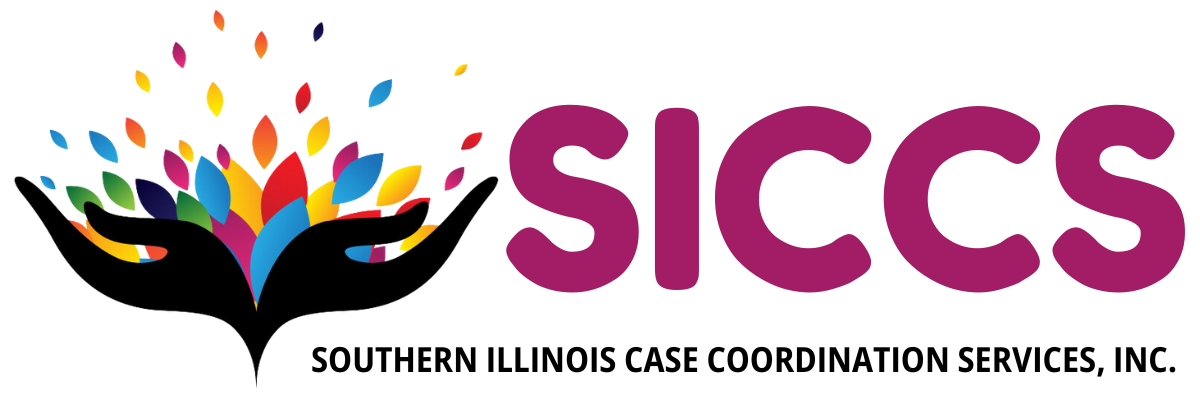
SICCS Services
Providing Advocacy, Options, and Supporting Choices
PUNS
The PUNS database is being used as the Illinois Department of Human Services Division of Developmental Disabilities’ official waiting list. The PUNS database registers people who want or need Developmental Disability Waiver services (i.e. Community Integrated Living Arrangements, Home Based Supports) funded by the IDHS/DDD. As funding is available, people are selected from PUNS and invited to apply for DD Waiver services. Completion of a PUNS form does not guarantee that a person is eligible for services or will be provided services.
See attached links from the Illinois Department of Human Services Website:
- Understanding PUNS - English Version
- Entender la PUNS - Spanish Version
- Signing Up for Services in PUNS
Who Can Enroll In PUNS?
Children, teens, and adults with a Developmental Disability (DD) who need or want services and/or supports.
Once a person over the age of 22 is selected from PUNS, the person will receive a level II assessment to substantiate clinical eligibility. If determined clinically eligible, the following waiver options will be presented:
- Home-Base Support Services (HBS): People who are or will be enrolled in HBS may select from a menu of services based on their individual needs within a monthly maximum budget amount. Typical services chosen by people and/or guardians, if applicable, may include, but are not limited to, community day services, personal support workers, and a variety of therapies.
- Residential Services: People who are or will be enrolled in adult waiver residential programs are provided with residential services and supports from the provider of their choice. These people and/or guardians, if applicable, may also select community day services and have a variety of therapies and other services available to them.
- Day Program and Vocational Services: Day and vocational services include Community Day Services, Supported Employment, Adult Day Care, and other day programs. These services are provided by community-based agencies and organizations to people throughout Illinois. These services are designed to enhance a person’s skill levels in the major life areas, work-related activities, and employment skills. Those who are of retirement age may also choose to retire.
Once a youth under the age of 22 is selected from PUNS, the youth will receive a level II assessment to substantiate clinical eligibility. If determined clinically eligible, the following waiver option will be presented:
- Support Waiver for Children and Young Adults with Developmental Disabilities (Children’s Support Waiver); This waiver provides support to children and young adults who live at home with their families. In combination with school-based services, natural supports, other community resources, and Medicaid State Plan services, services provided through the Children’s Support Waiver assist the family in meeting the child or young adult’s needs. Within a monthly and annual allocation for each Waiver person, families select from a menu of services based on the person’s needs. For Personal Support Workers, families may select from contracted provider agencies, as well as individual workers identified by the family.
Find out more on our Frequently Asked Questions page!
Pre-Admission Screening (PAS)
The Pre-Admission Screening is the activities performed to determine eligibility and prior authorization for all people for whom there is a reasonable basis to suspect the presence of a developmental disability who request Medicaid-funded services or the waiver alternative to nursing facility services. The role of the PAS process is to ensure compliance with applicable Federal and State laws, arrange for and conduct assessments, make necessary determinations regarding eligibility for services, educate people and families, make referrals, and provide linkage to appropriate and needed services. The PAS process prevents inappropriate admissions to long-term care facilities (nursing facilities, Intermediate Care Facilities for Persons with Developmental Disabilities (ICFs/DD), and Medically Complex Facilities for People with Developmental Disabilities (MCDD) and inappropriate enrollments in the Developmental Disability waiver program.
The Pre-Admission Screening includes the following activities:
- Conducting and securing assessments to determine service eligibility;
- Education of people, guardians, and families about service opportunities, including generic and specialized services;
- Submit to HFS an application for all people who are not already enrolled in the Medicaid program and have been selected from PUNS or are being authorized in a DDD Waiver;
- Notices of determinations provided to people and guardians;
- Presentation of service options;
- Referral to providers and services of choice;
- Assistance with service selection and linkage;
- Assistance in preparation and approval of submissions to the Department of Human Services (DHS) for capacity and rate requests when necessary;
- Monitoring for four weeks following initiation of services; and
- Accessibility 24-hours per day, 365 days per year for people in times of crisis.
Definition of a Developmental Disability
For there to be a reasonable basis to suspect a developmental disability, the condition must have manifested itself prior to the age of 18 for intellectual disability and age of 22 for a related condition. In other words, the condition must have been present during the developmental years.
- Intellectual Disability: Refers to significantly subaverage general intellectual functioning existing concurrently with deficits in adaptive behavior and manifested before the age of 18 years. Significantly subaverage is defined as an intelligence quotient (IQ) of 70 or below on standardized measures of intelligence. This upper limit could be extended upward depending on the reliability of the intelligence test used.
A person with any of the following related conditions* that is severe, chronic, manifested before the person reaches the age of 22 and is likely to continue indefinitely may also be eligible for developmental disability services:
- Cerebral palsy is a condition that may result in a determination of a developmental disability;
- Epilepsy is a condition that may result in a determination of a developmental disability;
- Autism and other disorders within the autism spectrum are conditions that may result in a determination of a developmental disability;
- Traumatic brain injury that occured PRIOR to the age of 22 is a condition that may result in a determination of a developmental disability.
*For above listed related conditions to meet clinical eligibility for developmental disability services, the specified condition must result in considerable deficits in self-care, understanding and the use of language, learning, mobility, self-direction, and the capacity for independent living.
Independent Service And Support Advocacy
Each person who is in the waiver is assigned an Individual Service and Support Advocate (ISSA). The ISSA is responsible for the following activities:
- Completion of the Discovery Process and developing the Personal Plan. Please refer to the Department of Human Services (DHS) website for more information regarding the Discovery and Personal Plan Process.
- Conducting quarterly visits to assess the person’s satisfaction with the outcomes and services as well as to monitor their health, safety, and welfare. The visits will include contact with the guardian, provider, and any other persons of the person’s choosing.
- Completing Level of Care Re-determinations.
- Annually, upon request or when changes in service occur, the Independent Service Coordination (ISC) Agency must inform people and/or guardian of rights under the Waiver using the current Rights of Individuals form.
- Assisting the person in self-advocacy with providers of Waiver services and assisting with conflict resolution.
- Conducting necessary problem-solving activities as issues arise regarding implementation of the Personal Plan, coordination of services, or general health and well-being.
- Referring any recurring, unresolved issues or serious problems affecting the person’s health and welfare to Division of Developmental Disabilities (DDD) so the Division can monitor or provide technical assistance as needed.
- Conducting necessary evaluations and assessments of individual service needs.
- Assisting people with linkage and applications for any non-waiver services; providing any necessary coordination of services.
- Assembling and submitting any necessary applications for changes in DDD Waiver Services, including those that require prior approval.
- Assisting people with appeals resulting from discharges, suspensions, or terminations of DDD Waiver services.
- Informing people of all willing and qualified providers.
- Explaining and providing information to people about reporting allegations of abuse, neglect and exploitations, as well as filing other complaints and grievances.
ADA/Olmstead Outreach
The U.S. Supreme Court’s 1999 landmark decision in Olmstead v. L.C. (Olmstead) found the unjustified segregation of people with disabilities is a form of unlawful discrimination under the Americans with Disabilities Act (ADA). Independent Service Coordination (ISC) Agency staff play a pivotal role in supporting the Olmstead decision and promoting community living through enforcement of the ADA and other key civil rights laws. The ISC provides outreach to people who reside in Intermediate Care Facilities for people with Developmental Disabilities (ICF/DDs) and State Operated Developmental Centers (SODCs) to ensure people with DD are aware of all community-based services and other living options and the process for getting access to those services to make informed decisions about their services.
See attached excerpt from the Illinois Department of Human Services Website:
Housing Navigator
The Illinois Division of Developmental Disabilities (DDD), 7 Independent Service Coordination (ISC) Agencies, and the Illinois Council on Developmental Disabilities (ICDD) are part of a Statewide pilot project titled The Housing Navigator Pilot. The pilot cultivates and pursues community-based, independent housing options for people with DD who are already in the waiver and those newly selected from the PUNS list.
See attached excerpt from the Illinois Department of Human Services Website:
Bogard Service Coordination
The staff of SICCS provides service coordination and advocacy for people who have developmental disabilities, reside in skilled nursing facilities, and were involved in a class action lawsuit.
Eligibility Requirements: The person must be an adult with a developmental disability who has been designated in writing by DHS as a Bogard class member. Bogard class members are defined in the modified Bogard Consent Decree as persons, 18 years of age or older with Developmental Disabilities, who, on or after March 23, 1986, resided in an Intermediate Care or Skilled Nursing Facility in Illinois as a Medicaid recipient for a period of more than 120 days in the aggregate. No person first admitted to an intermediate care facility or a skilled nursing facility on or after April 1, 1994, will be a member of the class.
Bogard Service Coordination provides the following services:
- Provision of assessments and reassessments of needs and goals;
- Coordination of the Service Plan;
- Specialized Service facilitation and brokering for persons in nursing facilities;
- Development of natural support networks;
- Performance of activities to maintain or approve availability, accessibility, and quality of services;
- Assistance with the procurement of adaptive equipment through the Department of Heathcare and Family Services;
- Monitoring the implementation of the Service Plan, as well as the person’s health, safety and well-being, through site visits to Residential and Day Program sites.
Cost
SICCS is funded by the Illinois Department of Human Services and provides services at no cost to people or families.

